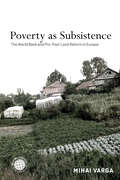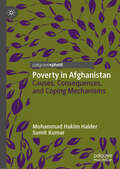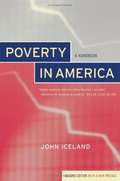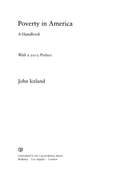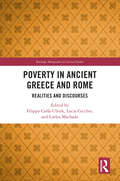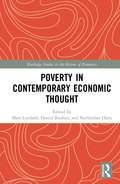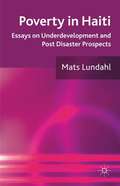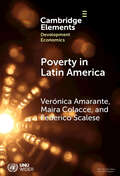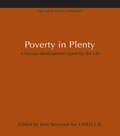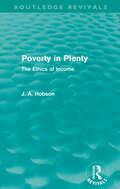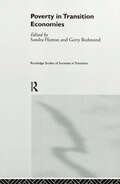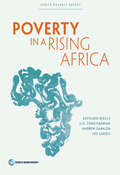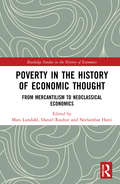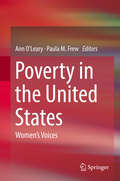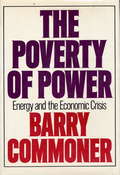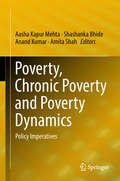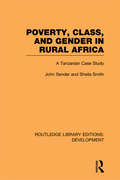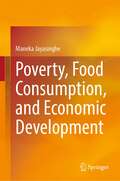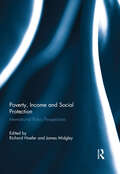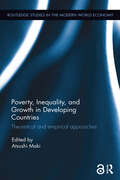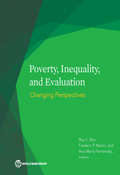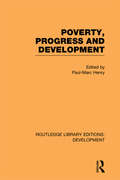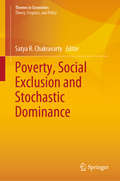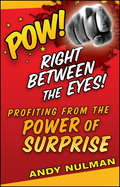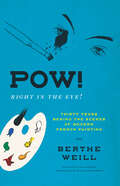- Table View
- List View
Poverty as Subsistence: The World Bank and Pro-Poor Land Reform in Eurasia (Emerging Frontiers in the Global Economy)
by Mihai VargaPoverty as Subsistence explores the 'propertizing' land reform policy that the World Bank advocated throughout the transitioning countries of Eurasia, expecting poverty reduction to result from distributing property titles over agricultural land to local (rural) populations. China's early 1980s land reform offered support for this expectation, but while the spread of propertizing reform to post-communist Eurasia created numerous "subsistence" smallholders, it failed to stimulate entrepreneurship or market-based production among the rural poor. Varga argues that the World Bank advocated a simplified version of China's land reform that ignored a key element of successful reforms: the smallholders' immediate environment, the structure of actors and institutions determining whether smallholders survive and grow in their communities. With concrete insights from analysis of the land reform program throughout post-communist Eurasia and multisited fieldwork in Romania and Ukraine, this book details how and why land reform led to subsistence and the mechanisms underpinning informal commercialization.
Poverty in Afghanistan: Causes, Consequences, and Coping Mechanisms
by Sumit Kumar Mohammad Hakim HaiderThis book examines the patterns, characteristics, causes and coping mechanisms of the poor in Afghanistan applying econometric and statistical techniques. The authors address and identify the extent of poverty in Afghanistan over the years, the spatial patterns and regional imbalances of poverty in Afghanistan, the distinguishing characteristics of the poor in Afghanistan, and explore shocks faced by the poor in Afghanistan as well as subsequent coping strategies. Based on household level data collected under the ‘National Risk Vulnerability Assessment’ (NRVA) survey of 2003, 2005, 2007/08 and 2011/12 of Afghanistan, the authors identify options that may enable policy makers and other stakeholders to further enable the inclusion of the poor in development processes and to successfully cope with poverty and its adverse outcomes. This short book will be of interest to students, researchers, academicians, policymakers, international agencies and NGOs at international and national levels.
Poverty in America: A Handbook (2nd edition)
by John IcelandA broad overview of poverty in the U.S., probing the various ways that it has been measured over time and the evolution of social thinking about poverty. Updated tables and a new preface.
Poverty in America: A Handbook, with a 2012 Preface
by John IcelandPoverty may have always been with us, but it hasn't always been the same. In an in-depth look at trends, patterns, and causes of poverty in the United States, John Iceland combines the latest statistical information, historical data, and social scientific theory to provide a comprehensive picture of poverty in America--a picture that shows how poverty is measured and understood and how this has changed over time, as well as how public policies have grappled with poverty as a political issue and an economic reality. Why does poverty remain so pervasive? Is it unavoidable? Are people from particular racial or ethnic backgrounds or family types inevitably more likely to be poor? What can we expect over the next few years? What are the limits of policy? These are just a few of the questions this book addresses. In a remarkably concise, readable, and accessible format, Iceland explores what the statistics and the historical record, along with most of the major works on poverty, tell us. At the same time, he advances arguments about the relative nature and structural causes of poverty--arguments that eloquently contest conventional wisdom about the links between individual failure, family breakdown, and poverty in America. At a time when the personal, political, social, and broader economic consequences of poverty are ever clearer and more pressing, the depth and breadth of understanding offered by this handbook should make it an essential resource and reference for all scholars, politicians, policymakers, and people of conscience in America.
Poverty in Ancient Greece and Rome: Discourses and Realities (Routledge Monographs in Classical Studies)
by Filippo Carlà-Uhink, Lucia Cecchet, and Carlos MachadoThis volume presents an innovative picture of the ancient Mediterranean world. Approaching poverty as a multifaceted condition, it examines how different groups were affected by the lack of access to symbolic, cultural and social – as well as economic – capital. Collecting a wide range of studies by an international team of experts, it presents a diverse and complex analysis of life in antiquity, from the archaic to the late antique period. The sections on Greece, Rome, and Late Antiquity offer in-depth studies of ancient life, integrating analysis of socio-economic dynamics and cultural and discursive strategies that shaped this crucial element of ancient (and modern) societies. Themes like social cohesion and control, exclusion, gender, agency, and identity are explored through the combination of archaeological, epigraphic, and literary evidence, presenting a rich panorama of Greco-Roman societies and a stimulating collection of new approaches and methodologies for their understanding. The book offers a comprehensive view of the ancient world, analysing different social groups – from wealthy elites to poor peasants and the destitute – and their interactions, in contexts as diverse as Classical Athens and Sparta, imperial Rome, and the late antique towns of Egypt and North Africa. Poverty in Ancient Greece and Rome: Discourses and Realities is a valuable resource for students and scholars of ancient history, classical literature, and archaeology. In addition, topics covered in the book are of interest to social scientists, scholars of religion, and historians working on poverty and social history in other periods.
Poverty in Contemporary Economic Thought (Routledge Studies in the History of Economics)
by Mats Lundahl Neelambar Hatti Daniel RauhutPoverty in Contemporary Economic Thought aims to describe and critically examine how economic thought deals with poverty, including its causes, consequences, reduction and abolition. This edited volume traces the ideas of key writers and schools of modern economic thought across a significant period, ranging from Friedrich Hayek and Keynes to latter-day economists like Amartya Sen and Angus Deaton. The chapters relate poverty to income distribution, asserting the point that poverty is not always conceived of in absolute terms but that relative and social deprivation matters also. Furthermore, the contributors deal with both individual poverty and the poverty of nations in the context of the international economy. In providing such a thorough exploration, this book shows that the approach to poverty differs from economist to economist depending on their particular interests and the main issues related to poverty in each epoch, as well as the influence of the intellectual climate that prevailed at the time when the contribution was made. This key text is valuable reading for advanced students and researchers of the history of economic thought, economic development and the economics of poverty.
Poverty in Haiti
by Mats LundahlFollowing the 2010 earthquake catastrophe, this book examines the economic and political challenges facing Haiti. It presents an overview of the country's economic history, and seeks new prospects for economic growth and development in the future.
Poverty in Latin America: Feelings/Perceptions vs Material Conditions (Elements in Development Economics)
by Verónica Amarante Maira Colacce Federico ScaleseThis Element derives subjective poverty lines for seven Latin American countries based on a Minimum Income Question included in household expenditure surveys. It compares poverty incidence under the subjective and objective approach, finding subjective poverty is larger than objective for all countries. People identified as poor are generally poor by both measures or only subjective poor, although patterns of overlapping differ between countries. It explores the factors associated to considering oneself as poor - being subjectively poor- when the per capita household income is higher than the objective poverty line. Generally, unemployment and informality are associated with higher probability of subjective poverty. Other factors not directly involving income but reflecting high economic security also tend to reduce the probability of feeling poor. Finally, the welfare stigma effect does not seem to hold, at least in terms of subjective poverty. This title is also available as Open Access on Cambridge Core.
Poverty in Plenty: A human development report for the UK (Earthscan Library Collection: Aid And Development Set Ser.)
by Jane Seymour'Poverty in Plenty breaks new ground in two ways. It is the first national Human Development Report to focus on an industrialised country and it is the first to be produced by a non-governmental organisation� While problems of poverty and deprivation are less extreme in countries such as the UK than in some other parts of the world, the human development message is still highly relevant. There are many people who suffer through inadequate housing, insufficient means to guarantee a nutritious diet and the absence of secure, rewarding and remunerative employment' From the Foreward by Sakiko Fukuda-Parr, Human Development Report Office, United Nations Development Programme 'The economics that dominates Britain � loosely known as globilisation � is a kind of religion which dictates that the worship of money should take preference over common buman values like the sharing of wealth and the right to a decent life. This report reveals the power of traditional economics over our society, and the way in which the lives of our grandmothers and grandfathers, men and women, girls and boys have been damaged and impoverished. I highly recommend it' Ann Pettifor, Director, Jubilee 2000 UK The UK's performance on poverty and deprivation ranks 16th out of 18 industrialised countries ? People living in Glasgow Shettleston are 3.8 times more likely to die before they are 65 years old than those living in Wokingham In industrialised countries, wealth and affluence are widely perceived to be growing, although not at the same rate for everyone. But economic growth is not the same as genuine human development. Poverty in Plenty applies accepted measures of human poverty � education, health and employment � to the UK, and assesses how our food and housing policies contribute to a sustainable way of life. It draws on the work of leading research institutes and campaigning groups to determine the real state of society in the UK. Using a range of indicators to measure livelihoods and well-being, the report shows how widespread poverty is and highlights the vast geographical disparities in levels of poverty that exist within the UK. It goes on to set out what urgently needs to be done to address the sobering trends revealed and describes effective policies that will allow us to improve the current situation. The findings are of vital importance to those working on social issues in the public and voluntary sectors, and to students and general readers wanting the truth behind the public statistics. Jane Seymour is an independent researcher and writer on health and environment issues. Originally published in 2000
Poverty in Plenty: The Ethics of Income (Routledge Revivals)
by J. A. HobsonFirst published in 1931, this Routledge Revivals title reissues J.A Hobson’s analysis of financial distribution in the early years of Twentieth Century Britain. The book focuses on the moral questions that he considered to be important in regard to the economic reforms that were necessary to secure the utilisation of modern productivity for the welfare of mankind. In this work, Hobson considers the wasteful working of the economic system, with its over-production, under-consumption and unemployment and states that these errors are due to the unfair way in which income is apportioned among the nations, classes and individuals that produce it. Poverty in Plenty argues for a conscious economic government inspired by a sense of justice and humanity. It makes suggestions towards the establishment of such a government and presents business prosperity as a problem of morals.
Poverty in Transition Economies (Routledge Studies of Societies in Transition #Vol. 14)
by Sandra Hutton Gerry RedmondThis study addresses the experience of, and responses to poverty in a range of transition economies including Russia, Ukraine, Hungary, Slovenia, Uzbekistan, Romania, Albania and Macedonia. It covers topics such as the definition of poverty lines and the measurement of poverty; the role of income-in-kind in supporting families; homelessness and destitution; housing; the design, targeting and administration of welfare; and personal responses to economic transition.
Poverty in a Rising Africa
by Kathleen Beegle Luc Christiaensen Andrew Dabalen Isis GaddisPerceptions of Africa have changed dramatically. Viewed as a continent of wars, famines and entrenched poverty in the late 1990s, there is now a focus on "Africa rising ? and an "African 21st century. ? Two decades of unprecedented economic growth in Africa should have brought substantial improvements in well-being. Whether or not they did, remains unclear given the poor quality of the data, the nature of the growth process (especially the role of natural resources), conflicts that affect part of the region, and high population growth. Poverty in a Rising Africa documents the data challenges and systematically reviews the evidence on poverty from monetary and nonmonetary perspectives, as well as a focus on dimensions of inequality. Chapter 1 maps out the availability and quality of the data needed to track monetary poverty, reflects on the governance and political processes that underpin the current situation with respect to data production, and describes some approaches to addressing the data gaps. Chapter 2 evaluates the robustness of the estimates of poverty in Africa. It concludes that poverty reduction in Africa may be slightly greater than traditional estimates suggest, although even the most optimistic estimates of poverty reduction imply that more people lived in poverty in 2012 than in 1990. A broad-stroke profile of poverty and trends in poverty in the region is presented. Chapter 3 broadens the view of poverty by considering nonmonetary dimensions of well-being, such as education, health, and freedom, using Sen's (1985) capabilities and functioning approach. While progress has been made in a number of these areas, levels remain stubbornly low. Chapter 4 reviews the evidence on inequality in Africa. It looks not only at patterns of monetary inequality in Africa but also other dimensions, including inequality of opportunity, intergenerational mobility in occupation and education, and extreme wealth in Africa.
Poverty in the History of Economic Thought: From Mercantilism to Neoclassical Economics (Routledge Studies in the History of Economics)
by Mats Lundahl Neelambar Hatti Daniel RauhutPoverty in the History of Economic Thought: From Mercantilism to Neoclassical Economics aims to describe and critically examine how economic thought deals with poverty and the poor, including its causes, consequences, reduction, and abolition. This edited volume traces the economic ideas of key writers and schools of thought across a significant period, ranging from Adam Smith and Malthus through to Wicksell, Cassel, and Heckscher. The chapters relate poverty to income distribution, asserting that poverty is not always conceived of in absolute terms, and that relative and social deprivation matter also. Furthermore, the contributors deal with both individual poverty and the poverty of nations in the context of international economy. By providing such a thorough exploration, this book shows that the approach to poverty differs from economist to economist, depending on their particular interests and the main issues related to poverty in each epoch, as well as the influence of the intellectual climate that prevailed at the time when the contribution was made. This key text is valuable reading for advanced students and researchers of the history of economic thought, economic development, and the economics of poverty.
Poverty in the United States
by Ann O'Leary Paula M. FrewThis important text explores the deep relationships between poverty, health/mental health conditions, and widespread social problems as they affect the lives of low-income women. A robust source of both empirical findings and first-person descriptions by poor women of their living conditions, it exposes cyclical patterns of structural and environmental stressors contributing to impaired physical and mental health. Psychological conditions (notably depression and PTSD), substance use and abuse, domestic and gun-related violence, relationship instability, and hunger in low-income communities, especially among women of color, are discussed in detail. In terms of solutions, the book's contributors identify areas for major policy reform and make potent recommendations for community outreach, wide-scale intervention, and sustained advocacy. Among the topics covered: * The intersection of women's health and poverty. * Poverty, personal experiences of violence, and mental health. * The role of social support for women living in poverty. * The logic of exchange sex among women living in poverty. * Physical safety and neighborhood issues. * Exploring the complex intersections between housing environments and health behaviors among women living in poverty. A stark reminder that health should be considered a basic human right, Poverty in the United States: Women's Voices is a necessary reference for research professionals particularly interested in women's studies, HIV/AIDS prevention, poverty, and social policy.
Poverty of Power
by Barry Commoner"In the last ten years, the United States--the most powerful and technically advanced society in human history--has been confronted by a series of ominous, seemingly intractable crises. First there was the threat to the environmental survival; then there was the apparent shortage of energy: and now there is the unexpected decline of the economy. These are usually regarded as separate afflictions, each to be solved in its own terms: environmental degradation by pollution controls; the energy crisis by finding new sources of energy and new ways of conserving it; the economic crisis by manipulating prices, taxes, and interest rates. But each effort to solve one crisis seems to clash with the solution of the others--pollution control reduces energy supplies; energy conservation jobs. Inevitably, proponents of one solution become opponents of the others. Policy stagnates and remedial action is paralyzed, adding to the confusion and gloom that beset the country." So opens Barry Commoner's The Poverty of Power, the book in which America's great biologist and environmentalist addresses himself to the central question of our day. He concludes that "what confronts us is not a series of separate crises, but a single basic deficit--a fault that lies deep in the design of modern society. This book is an effort to unearth that fault, to trace its relation to the separate crises, and to consider what can be done to correct it at its root."
Poverty, Chronic Poverty and Poverty Dynamics: Policy Imperatives
by Anand Kumar Amita Shah Aasha Kapur Mehta Shashanka BhideThis book discusses critical policy issues that need to be addressed if India wishes to achieve the SDG 1 based elusive goal of ending poverty in the country. In its nine chapters, it takes the readers through trends and estimates of poverty in India, explains changes in the way it has been measured over time and the factors that lead to persistence of poverty, draws attention to the fact that hunger is both a cause and an effect of poverty and has gender and age dimensions too. The book revisits strategies that were successful in addressing poverty emanating from situations of conflict, presents a discussion on migration as a critical coping mechanism among poor, analyses the links between ill health and poverty as well as education and poverty to draw attention to the policy imperatives that need attention.India’s report card on poverty remains dismal even though there is recognition of the importance of reducing or eliminating or ending it at both national and global levels. Despite rapid economic growth and improvement on a range of development indicators, an unacceptably high proportion of India’s population continues to suffer poverty in multiple dimensions. SDG 1 or “ending poverty in all its forms everywhere” cannot be achieved unless policies and poverty alleviation programmes understand and address chronic poverty and its dynamics. This requires that we estimate and understand the extent of poverty, the factors that lead to people getting stuck in it and the ways this can be addressed. It also requires understanding the dynamic nature of poverty or the fact that many of those who are poor are able to move out of poverty as well as the fact that many others who are not poor become impoverished. These are the issues that are comprehensively examined and addressed in this book.In addition to students, teachers and researchers in the areas of development, economic growth, equity and welfare, the book is also of great interest to policy makers, planners and non‐government agencies who are concerned with understanding and addressing poverty-related issues in the developing countries.
Poverty, Class and Gender in Rural Africa: A Tanzanian Case Study (Routledge Library Editions: Development)
by Sheila Smith John SenderFocussing on a Fieldwork study of the West Usambaras in Tanzania, this study, first published in 1990, deals with processes of class formation and capitalist accumulation, and the dynamics of rural poverty and gender relations. Arguing that rural differentiation is systematically reinforced by the socialist state, the authors offer a critique of government intervention and discuss alternative, more effective forms of policy.
Poverty, Food Consumption, and Economic Development
by Maneka JayasingheThis book investigates the relationships between economies of scale in food consumption and a number of socio-economic and demographic characteristics of households and household behavioural choices since food is the major share of household expenditure for poor households. The characteristics considered comprise household size, location, income, and gender of the head of household while the behavioural choices considered comprise the decision to consume home-grown food and the decision to adopt domestic technology to aid food preparation and consumption. The book proposes two theoretical models to rationalize the role of the consumption of home-grown food and the adoption of domestic technology in enhancing economies of scale in food consumption. Econometric models are also used to empirically test the validity of the two theoretical models while adjusted poverty estimations are derived numerically using the estimated equivalence scales. Although data used in applying these techniques are based on four Household Income and Expenditure Surveys conducted by the Department of Census and Statistics (DCS) in Sri Lanka, the methodology can be used for similar analysis in relation to any other country.
Poverty, Income and Social Protection: International Policy Perspectives
by James Midgley Richard HoeferThis book provides insights into the way social protection policy is being redefined as a result of the new commitment by governments around the world to use these programs to reduce poverty. The case studies presented show how innovations in social protection have emerged in different countries. They also discuss various aspects of social protection that will be of interest to readers. While some of the case studies are primarily descriptive and seek to document recent trends in different countries, they also address important social policy issues. Others are particularly topical because they provide useful updates on recent social protection innovations. Countries discussed include Brazil, Britain, Chile, China, Indonesia, South Africa, and the United States. This book was originally published as a special issue of the Journal of Policy Practice.
Poverty, Inequality and Growth in Developing Countries: Theoretical and empirical approaches (Routledge Studies in the Modern World Economy)
by Atsushi MakiThere are many problems regarding poverty, inequality and growth in developing countries in Asia and Africa. Policy makers at the national level and at international institutions such as the United Nations, World Bank, International Monetary Fund and others have implemented various policies in order to decrease poverty and inequality. This book provides empirical observations on Asian countries and Africa. Each chapter provides theoretical and empirical analysis on regional case studies with an emphasis on policy implications. The book will be of use to many who wish to assess and improve policies in developing countries and mitigate poverty and inequality, and stimulate growth, by drawing on relevant empirical research and economic theories. Clearly, there have been numerous policy failures and the book aims to provide a basis for improving policies and outcomes based on relevant empirical observations.
Poverty, Inequality, and Evaluation
by Ray C. Rist Frederic P. Martin Ana Marãa FernandezThe basic premise of this book is that the conversation on the future of development needs to shift from a focus on poverty to that of inequality. The poverty emphasis is in an intellectual and political cul de sac. It does not address the fundamental question of why people are poor nor what can be done structurally and institutionally to reduce and eliminate it. The various chapters illustrate in the context of various countries and sectors around the world, the significant contributions that evaluators can make in terms of improvement of the analytical framework, analysis of the performance and results of specific programs and projects, as well as assessing and designing better public management systems in terms of poverty and inequality reduction. Beyond the specific contributions presented, three characteristics characterize those evaluations to be relevant for poverty and inequality analysis: a global-local approach: Global to move beyond disciplinary boundaries and consider cross-cutting issues, local to account for the diversity of countries, sectors, institutions and cultures considered; a problem-solving orientation: The issue evaluated is the core focus and determines the choice of evaluation methods to analyze this issue from a variety of angles; an evolutionary approach: Chapters presented are from iconoclasts who do not have any pre-established theory or school of thought to defend. This is the result of openness of mind and ability to adapt the analytical framework, the evaluation methods, and the interpretation of results in a constant interaction with the stakeholders. Such characteristics make evaluation a domain that can help understand better complex issues like poverty, inequality, vulnerability, and their interactions as well as propose a relevant and useful theory of change for public policies and projects to improve the plight of a large part of the world population in industrialized and developing countries alike.
Poverty, Progress and Development (Routledge Library Editions: Development)
by Paul-Marc HenryThe studies of poverty, progress and development in this volume, first published in 1991, by a distinguished international roster of authors and researchers, aim to increase knowledge of the social mechanisms of pauperization, marginalization, and the exclusion of certain categories of society; to bring to light the potential and creative role of socio-cultural, intellectual, ethical, moral and spiritual values in progress and the development process; and to examine the links and contradictions between development and progress in order to propose ways of reducing social inequalities.
Poverty, Social Exclusion and Stochastic Dominance (Themes in Economics)
by Satya R. ChakravartyThis book honors the memory of Tony Atkinson, who made significant contributions to the rigorous study of income inequality, poverty, and redistribution. These essays presented, covering a span of over 30 years of research and scholarship, have been at the forefront of distributional analysis, and many of them are of prime importance for contemporary developments in the real-valued measurement of poverty and inequality, with particular reference to the concepts of fuzzy poverty assessment, vulnerability, heterogeneity/multidimensionality, unit consistency, sub-group decomposability, and dominance criteria. While all of these articles have been previously published—singly or with co-authorship—in a number of professional journals or distinguished edited volumes, this book is greatly enriched by a substantial introductions by the authors, which place the contributions in context, highlights their inter-connectedness, and relates them to the work of Tony Atkinson and other scholars. This book is of intrinsic value to welfare analysts, as well as being a tribute to a very great scholar by a fellow economist.
Pow! Right Between the Eyes
by Andy NulmanPow! Radical new methods for reaching jaded, cynical consumersPut simply, when it comes to your business, your new idea, even yourself, this book can be the difference between a "Who cares?" and a "Holy cow!"Business, both big and small, is in desperate need of new ways to inspire bored and cynical consumers who have grown weary of the same old song and dance. In today's information economy, it doesn't matter how many people you reach, but how much attention they pay. And the best way to get attention is with the powerful, but largely misunderstood, element of surprise.Pow! Enter Andy Nulman with the art of surprise marketing. An explosive new outlook, surprise marketing solidifies the bond between you and your customers like nothing else, and keeps them coming back for more by providing a continuous flow of what they never expected. Pow! Right Between the Eyes reveals the secrets, theories, and tactics of surprise marketing, and wields outrageous real-world examples (and even more outrageous tools like "The Lubricant to Yes" and "Euphoric Shock") to help expand the boundaries of the extreme and create a bigger bang for bigger profits.On his quest to unlock the secret of why some things knock your socks off and others put you to sleep, Nulman shares insights from director Alfred Hitchcock, designer Philippe Starck, playwright David Mamet, Family Guy creator Seth McFarlane, Harvard psychologists, songwriters, bloggers, and even the inventor of Pirate Booty snack chips. And he shows how today's smartest companies are winning big with surprises stories like:* How Oprah's shocking announcement that "Everybody gets a car!" sent her Web site traffic up 800% and helped the Pontiac G6 outsell its competitors by 20%* How Target earns $7 billion a year in free publicity with stunts like a floating temporary store in New York's Hudson River or putting on a vertical fashion show where acrobat models walked down the side of Rockefeller Center* How Bear Naked Granola reversed the trick-or-treat tradition by sending costumed street teams door-to-door to give away granola samples on HalloweenAndy Nulman is a wildly-successful businessman and even wilder public speaker who first learned the power of surprise working with Jay Leno, Jerry Seinfeld, Jim Carrey, and many other comedians as the cofounder and CEO of the Just For Laughs Festival, the world's largest comedy event. His book shares hilarious and effective surprise promotions that he himself dreamed up for the event and in his current position as cofounder, President, and CMO of Airborne Mobile, which brings brands like Maxim, Family Guy, and the NFL to the mobile media world.Don't forget to read the book's two forewords by the legendary John Cleese and CBS Late Late Show host Craig Ferguson. Surprising choices for a business book? Well...what did you expect?
Pow! Right in the Eye!: Thirty Years behind the Scenes of Modern French Painting (Abakanowicz Arts and Culture Collection)
by Berthe WeillMemoir of a provocative Parisian art dealer at the heart of the 20th-century art world, available in English for the first time. Berthe Weill, a formidable Parisian dealer, was born into a Jewish family of very modest means. One of the first female gallerists in the business, she first opened the Galerie B. Weill in the heart of Paris’s art gallery district in 1901, holding innumerable exhibitions over nearly forty years. Written out of art history for decades, Weill has only recently regained the recognition she deserves. Under five feet tall and bespectacled, Weill was beloved by the artists she supported, and she rejected the exploitative business practices common among art dealers. Despite being a self-proclaimed “terrible businesswoman,” Weill kept her gallery open for four decades, defying the rising tide of antisemitism before Germany’s occupation of France. By the time of her death in 1951, Weill had promoted more than three hundred artists—including Henri Matisse, Pablo Picasso, Amedeo Modigliani, Diego Rivera, and Suzanne Valadon—many of whom were women and nearly all young and unknown when she first exhibited them. Pow! Right in the Eye! makes Weill’s provocative 1933 memoir finally available to English readers, offering rare insights into the Parisian avant-garde and a lively inside account of the development of the modern art market.
